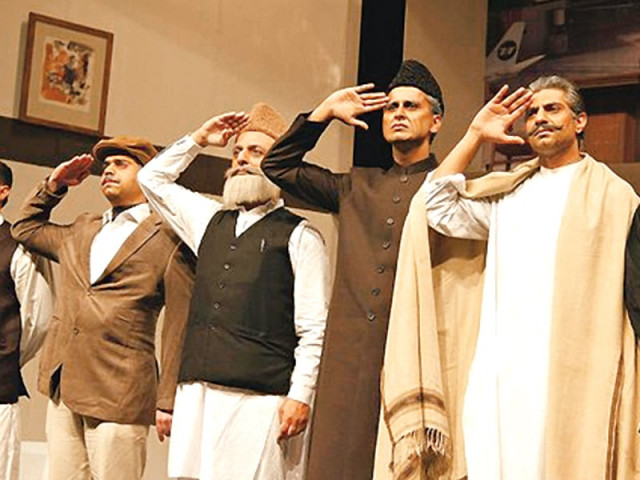The undying Pawnay 14 August
A satire of the deteriorating political scenario, owing to the ills committed by those in power.

Following successful rounds in Karachi, Islamabad and Dubai, the play will be touring to the United States in September this year. PHOTO: FILE
Revamped to satirise the changing political scenario, yet another version of Anwar Maqsood’s play ‘Pawnay Chauda August’ premiered at the Islamabad Club on Thursday evening.
Maqsood explained that when he penned the play over two years ago, the state-of-affairs was much different and perhaps it has only deteriorated with each passing day. “I’m guilty and everyone from my generation should be punished for what they have done to the country,” he said, while expressing faith in the youth, who he feels, is better off without any political party.
Directed by Dawar Mehmood of KopyKat Productions, the play strikes a raw nerve of the people, who are reeling from a steady decline; owing to the ills committed by those in power, throughout political history. What ensues is an emotional rollercoaster ride with lingering moments of silent introspection.
The play opens at the Karachi airport, where Muhammad Ali Jinnah (Zahid Ahmed), Muhammad Iqbal (Talal Jilani) and Maulana Shaukat Ali (Aamer Agha) are waiting for their flight to Islamabad on August 15. Having descended from the heavens four days earlier, they have come to celebrate Independence Day. However, they find themselves far away from the country they may have anticipated.
With unconfirmed tickets and endless time on avail, they meet various characters including rivaling politicians, an army officer, a Bangladeshi, a drug addict, a school principal and a female police officer, only to discover that the country is in the throes of chronic crises.

Mariam Saleem Nawaz, who plays three characters — the school principal, an over-the-top supporter of the Pakistan Tehrik-e-Insaaf and a Punjabi-speaking police officer, transforms from one role to the next within a matter of minutes. Nuanced in her expression, she brings out diversity among the few female actors in the play.
Yasir Husain, as the druggie, the ajrak-toting Sindhi minister and the Bangladeshi, is barely recognisable through the role transitions, owing to the eccentricities, garb and accents unique to each character. His lines and comic timing make for an entertaining combination.
A major theme in the play is the poetry of Iqbal, which the characters twist, manipulate and distort in their dialogue; it is humorous for the audience and unsettling for the character himself.
While Jinnah and Iqbal are heartbroken over how things have shaped up, Ali offers the much-needed comic relief with his lively, exaggerated antics.
Much to their dismay, nobody recognises them at the airport, except for an innocent child. When the air hostess asks him, do you know who they were, he says, “maybe.” The child symbolises the future of the country.

Before exiting, Jinnah delivers a moving, in-the-moment speech, starting with, “What I’m about to say is not something you have read in history books, nor have you heard about it on the radio or seen it on television.” He finishes off with the crux of the matter, “I could’ve lived a little longer, had the ambulance arrived on time.”
Following successful rounds in Karachi, Islamabad and Dubai, the play will be touring to the United States in September this year.
On challenges in portraying their characters:
Aamer Agha: “It’s tough for us actors. I’m crying real tears as Anwar sb said, ‘you have to feel it and let them (the audience) feel it’ and considering that it’s live, I’m switching to a comedy sequence with tears still rolling down my face.”
Zahid Ahmed: “The actual challenges lied in portraying various reactions with just a few lines. In the beginning, Jinnah is hopeful, but as the story progresses, he becomes frustrated, so it’s more pathos than anything else and the character journey is quite challenging in that way.”
Talal Jilani: “Iqbal is a one-of-a-kind national hero, with a unique perception and the highest level of philosophy. I don’t get to be a part of many jokes and the reason behind that is that Iqbal is much deeper than that. My challenge is to make his character look believable to those who follow his school-of-thought ardently.”
Mariam Saleem Nawaz: “It’s the emotional shift because all of them are contrasting characters, coming from different places altogether. The PTI supporter is this high-flying, dramatic, superficial and crazy woman while the police officer is an imposing woman in a man’s world.”
Published in The Express Tribune, May 19th, 2014.
Like Life & Style on Facebook, follow @ETLifeandStyle on Twitter for the latest in fashion, gossip and entertainment.



















COMMENTS
Comments are moderated and generally will be posted if they are on-topic and not abusive.
For more information, please see our Comments FAQ